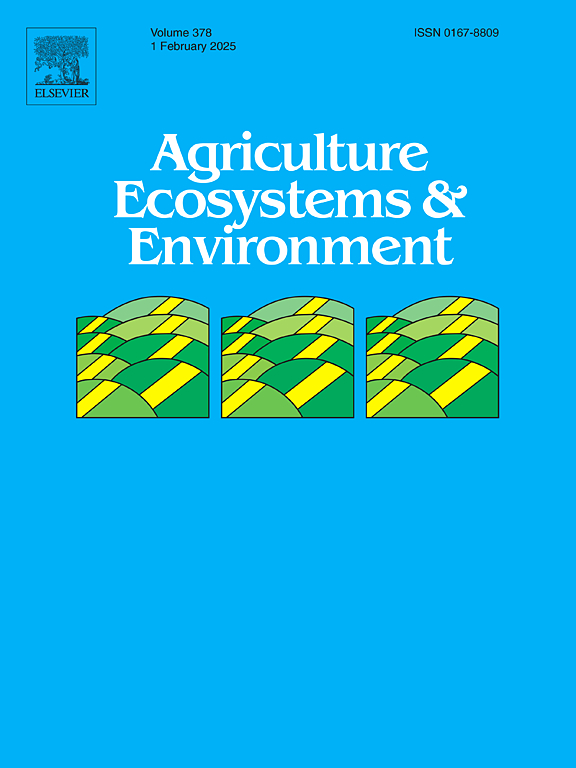Agroecological interventions increase biodiversity and the potential for climate change mitigation in Europe
IF 6.4
1区 农林科学
Q1 AGRICULTURE, MULTIDISCIPLINARY
引用次数: 0
Abstract
Agroecology has gained considerable interest as a concept for designing sustainable agrifood systems. To date however, the effects of farming systems and management practices associated with agroecology (i.e., agroecological interventions) on biodiversity and climate change mitigation have not been systematically reviewed. Here, we perform a meta-analysis using observational and experimental studies to assess the effects of agroecological interventions on taxa diversity, as well as on greenhouse gas emissions (GHG) and carbon storage in Europe. Agroecological interventions were classified along a gradient ranging from input substitution to system redesign in order to estimate and compare effects of different agroecological transition types. We found a general positive effect of agroecological interventions across biodiversity and climate change mitigation metrics. Agroecological interventions increased diversity of all functional groups of organisms considered, as well as promoting soil carbon storage, and reducing nitrous oxide emissions. However, agroecological interventions had limited effects on the mitigation of carbon dioxide and methane emissions. Positive effects on biodiversity and climate change mitigation metrics were consistent for transitions from conventional farming interventions to either input substitution or redesign interventions. A win-win situation was found in most studies in which both biodiversity and climate change mitigation data were recorded, driven by changes in micro-decomposer biodiversity and in soil C storage. Our findings demonstrate the multiple environmental benefits that can be obtained from adopting an agroecological approach to farming, and highlight the value of this approach for achieving European Union targets in relation to both GHG emission reduction and biodiversity.
农业生态干预措施增加了欧洲的生物多样性和减缓气候变化的潜力
农业生态学作为设计可持续农业粮食系统的一个概念已经获得了相当大的兴趣。然而,迄今为止,与生态农业(即生态农业干预措施)有关的耕作制度和管理做法对生物多样性和减缓气候变化的影响尚未得到系统审查。在此,我们利用观察和实验研究进行了荟萃分析,以评估农业生态干预对欧洲分类群多样性以及温室气体排放(GHG)和碳储量的影响。为了估计和比较不同农业生态转型类型的影响,我们沿着从投入替代到系统重新设计的梯度对农业生态干预措施进行了分类。我们发现农业生态干预在生物多样性和气候变化减缓指标方面具有总体积极影响。农业生态干预措施增加了所考虑的所有生物功能群的多样性,并促进了土壤碳储存,减少了一氧化二氮的排放。然而,农业生态干预措施对减少二氧化碳和甲烷排放的影响有限。从传统农业干预措施到投入替代或重新设计干预措施的转变对生物多样性和气候变化缓解指标的积极影响是一致的。在微分解者生物多样性和土壤C储量变化的推动下,大多数记录了生物多样性和气候变化减缓数据的研究都发现了一个双赢的局面。我们的研究结果表明,采用农业生态方法可以获得多种环境效益,并强调了这种方法对实现欧盟在温室气体减排和生物多样性方面的目标的价值。
本文章由计算机程序翻译,如有差异,请以英文原文为准。
求助全文
约1分钟内获得全文
求助全文
来源期刊

Agriculture, Ecosystems & Environment
环境科学-环境科学
CiteScore
11.70
自引率
9.10%
发文量
392
审稿时长
26 days
期刊介绍:
Agriculture, Ecosystems and Environment publishes scientific articles dealing with the interface between agroecosystems and the natural environment, specifically how agriculture influences the environment and how changes in that environment impact agroecosystems. Preference is given to papers from experimental and observational research at the field, system or landscape level, from studies that enhance our understanding of processes using data-based biophysical modelling, and papers that bridge scientific disciplines and integrate knowledge. All papers should be placed in an international or wide comparative context.
 求助内容:
求助内容: 应助结果提醒方式:
应助结果提醒方式:


